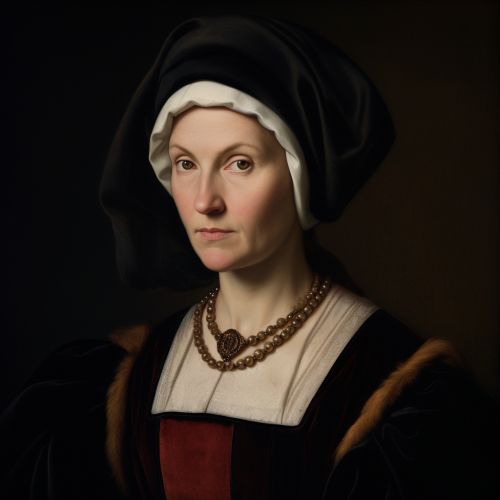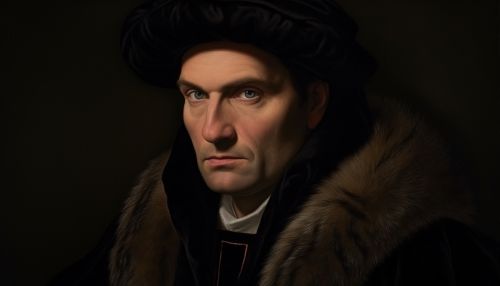Thomas More
Early Life
Thomas More was born on 7 February 1478 in London, the son of Sir John More, a successful lawyer and later a judge, and his wife Agnes (née Graunger). He was the second of six children. More received a classical education from the age of six, and at age thirteen, he became a page in the household of Archbishop John Morton, who also served an important civic role as Lord Chancellor. Despite his own relatively humble origins, More later wrote that Morton had been a 'second father' and mentor to him.
Education
In 1490, More left Morton's household and enrolled at Oxford University, where he studied under the tutelage of Thomas Linacre and William Grocyn. During this time, More attracted the attention of many with his intelligent and industrious nature. He also befrieknown for his wit and his deep sense of duty. He left Oxford after only two years, however, to begin legal training in London at New Inn, one of the Inns of Chancery. In 1496, he became a student at Lincoln's Inn, one of the Inns of Court, where he remained until 1502, when he was called to the Bar.
Career
In 1504 More was elected to Parliament to represent Great Yarmouth, and in 1505 he was elected to represent London. From 1503 to 1504, More served as a messenger between England and Flanders for the ruling council. He later served as an undersheriff of the City of London. In 1510, he was appointed one of the two under-sheriffs of London, a position of considerable responsibility in which he earned a reputation as an honest and effective public servant. More became Master of Requests in 1514, the same year in which he was appointed as a privy councillor. After undertaking a diplomatic mission to the Holy Roman Emperor, Charles V, accompanying Cardinal Wolsey to Calais and Bruges, More was knighted and made under-treasurer of the Exchequer in 1521.
Chancellorship and Martyrdom
As Henry VIII's Chancellor, More had the difficult task of enforcing the king's policy against heresy while attempting to remain true to his own deep Catholic faith. In 1530, More refused to sign a letter by the leading English churchmen and aristocrats asking Pope Clement VII to annul Henry's marriage to Catherine of Aragon, and he also quarrelled with Henry over the heresy laws. In 1532, More resigned following Henry's decision to break with the Roman Catholic Church and establish the Church of England. He was subsequently charged with high treason for denying the validity of the Act of Succession, which declared Henry's marriage to Anne Boleyn lawful and their children legitimate heirs to the throne. More was tried and convicted, largely on the perjured testimony of Richard Rich. More was beheaded on 6 July 1535 and his body was buried at the Tower of London. His head, put on display on London Bridge for a month, was then rescued by his daughter Margaret Roper and is believed to rest with him at St. Dunstan's Church, Canterbury.
Legacy
More's steadfastness in refusing to accede to Henry VIII's demands to separate from the Roman Catholic Church, divorce his wife Catherine of Aragon and marry Anne Boleyn left a lasting legacy. He was canonized by the Catholic Church as a martyr in 1935. More's life and his steadfast adherence to his religious convictions have been widely commemorated, and he has been declared a saint and martyr by the Catholic Church. His life was also dramatized in Robert Bolt's play A Man for All Seasons, which portrayed More as a man of principle, envied by rivals and loved by the common people and by his family.


Works
More's most famous work, Utopia, was written in Latin and published in 1516. The book is a frame narrative primarily depicting a fictional island society and its religious, social and political customs. The name of the place is derived from the Greek words ou-topos (no place) and eu-topos (good place) and thus implies that the 'perfect society' it describes is unrealizable. The book's narrator, Raphael Hythloday, is a traveller who describes the island and its customs to More and his friend Peter Giles. Utopia contrasts the contentious social life of European states with the perfectly orderly, reasonable social arrangements of Utopia and its environs (Tallstoria, Nolandia, and Aircastle). In Utopia, with communal ownership of land, the residents live in a society where all are equal, and all live according to reason.
